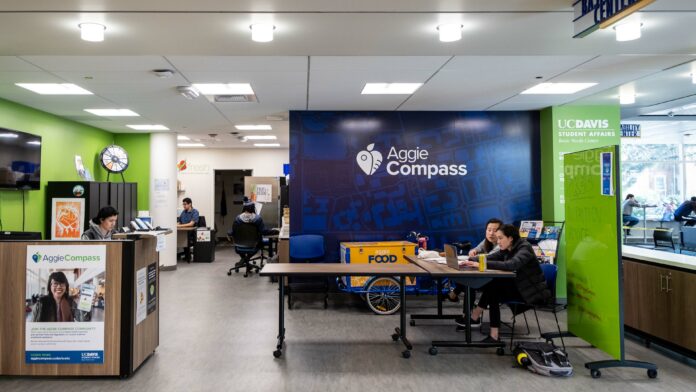Students in need receive weekly, customizable grocery bags
The Aggie Compass Basic Needs Center and The Pantry are teaming up to help provide students with basic needs despite constraints of the county and statewide shelter-in-place order and social distancing. Both spaces are currently closed in accordance with the county’s shelter-in-place order, but both teams remain dedicated to providing assistance and resources to students virtually and in new, innovative ways.
The evolving COVID-19 pandemic has simultaneously increased students’ need for basic needs and restricted the abilities of programs like Aggie Compass and The Pantry to meet these needs.
Homelessness and food insecurity are prevalent issues among college students across the country. Around 250,000 students experienced homelessness in California in 2018, according to the U.S. Interagency Council on Homelessness. And more than 6.5 million Americans were forced to file for unemployment last week, according to The Guardian.
At UC Davis, with nonessential services shutting down, many students have found themselves with reduced hours or out of work entirely.
Before the COVID-19 pandemic, The Pantry provided around 800 UC Davis students with food products every day. To combat food insecurity during the pandemic, The Pantry and the Aggie Compass Basic Needs Center have partnered to create a weekly grocery bag program for students. While both The Pantry and Aggie Compass’ physical locations have closed, many services provided by both centers remain available online.
Every week, 150 students can sign up by Sunday night to receive a pre-filled grocery bag on Thursday between 12:00 p.m. and 2:00 p.m. Instead of receiving food products in the MU, students can pick up their groceries on the Quad where pre-filled bags are spaced six feet apart from one another.
On April 2, Aggie Compass and The Pantry provided 240 grocery bags filled with a week’s worth of groceries to students, nearly 100 more than they originally anticipated.
“Students will have the option to choose between a meat bag, a vegetarian bag or both,” said Ryan Choi, the director of The Pantry.
In addition to providing access to food products, Choi spoke at length about The Pantry’s goal of providing for students’ needs that may differ based on cultural or religious belief. Providing vegetarian options for students is one way Choi hopes to respect the diversity of students’ backgrounds and needs.
After picking up their bag of groceries, students can check out with student volunteers from The Pantry and Aggie Compass, tabling nearby on the South Quad.
In addition to groceries, students have the option to receive menstrual products in weekly grocery bags.
PERIOD, a campus club, usually provides menstrual products in bathrooms across campus. The club is also adapting to the new constraints and demands created by COVID-19.
Sabina Kabra, a fourth-year genetics and genomics major, is the operations and donations director for PERIOD.
“During the coronavirus pandemic, more and more people are facing uncertainty surrounding health, shelter, employment, food and other necessities,” Kabra said. “PERIOD is trying to alleviate some of this uncertainty by providing free menstrual products. Menstrual products are a necessity and periods don’t stop during an epidemic.”
PERIOD has donated over 3,000 menstrual products, according to Choi.
Usually, The Pantry relies on both donations and their partnership with the Yolo County Food Bank to provide products for students. Due to the COVID-19 epidemic, the Yolo County Food Bank has become inundated with increased community demand for food. As a result, The Pantry is in need of community support and monetary donations now more than ever, according to Choi.
The Pantry and Aggie Compass have also adopted strict procedures to help promote the health and safety of volunteers, staff and students. Groceries are pre-bagged in reusable bags to minimize the contact and possible contamination.
Because the service relies on the availability of reusable bags, The Pantry and Aggie Compass encourage students to donate reusable bags upon picking up their bag of groceries in order to minimize costs of the service. Bags donated are sanitized and isolated in a room separate from food products where they remain for four days prior to food distribution.
In addition to weekly grocery bag services, Aggie Compass remains dedicated to helping students in crisis throughout the COVID-19 epidemic.
“Our basic needs coordinator […] is meeting with students via Zoom and providing support in the form of swipes, grocery cards and emergency grants and rental assistance,” said Leslie Kemp, the director of Aggie Compass, via email.
Students in need of housing or emergency food resources have the ability to fill out an online basic needs request form and can get immediate support within two to three days.
Written by: Ally Russell — campus@theaggie.org









